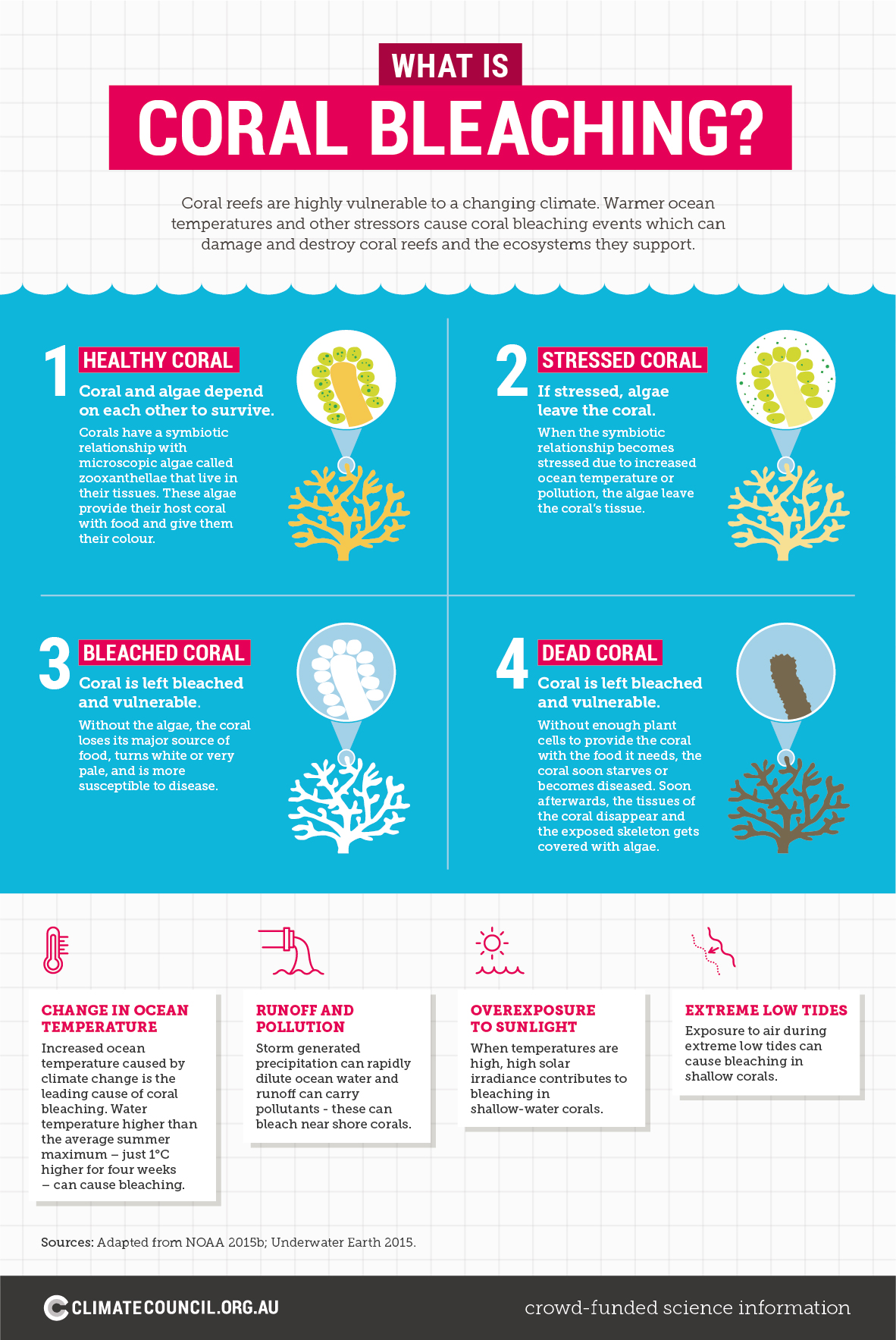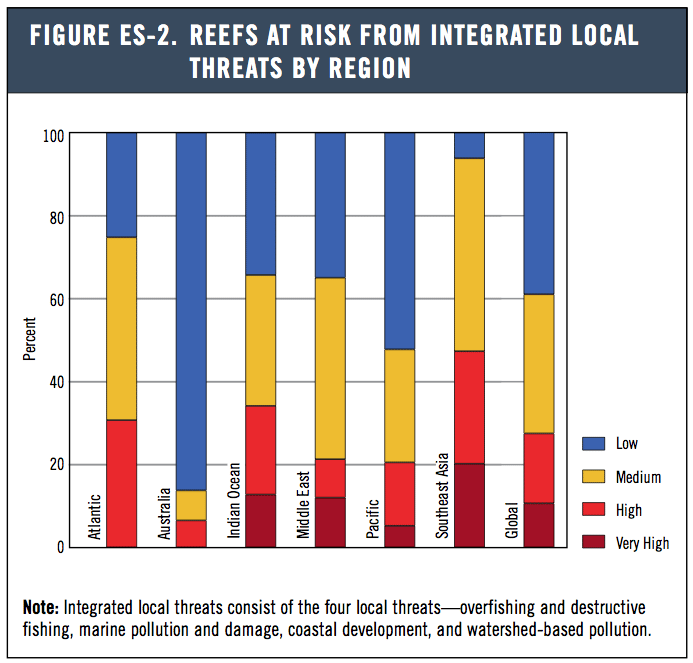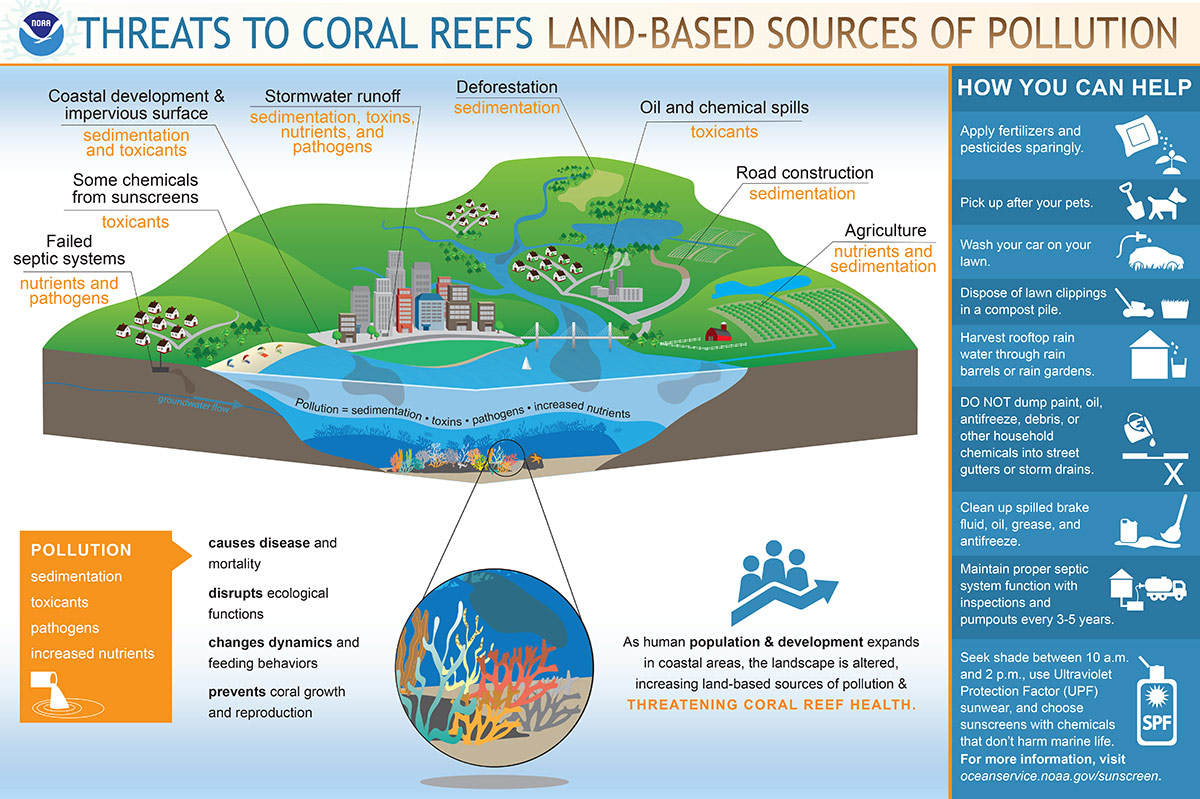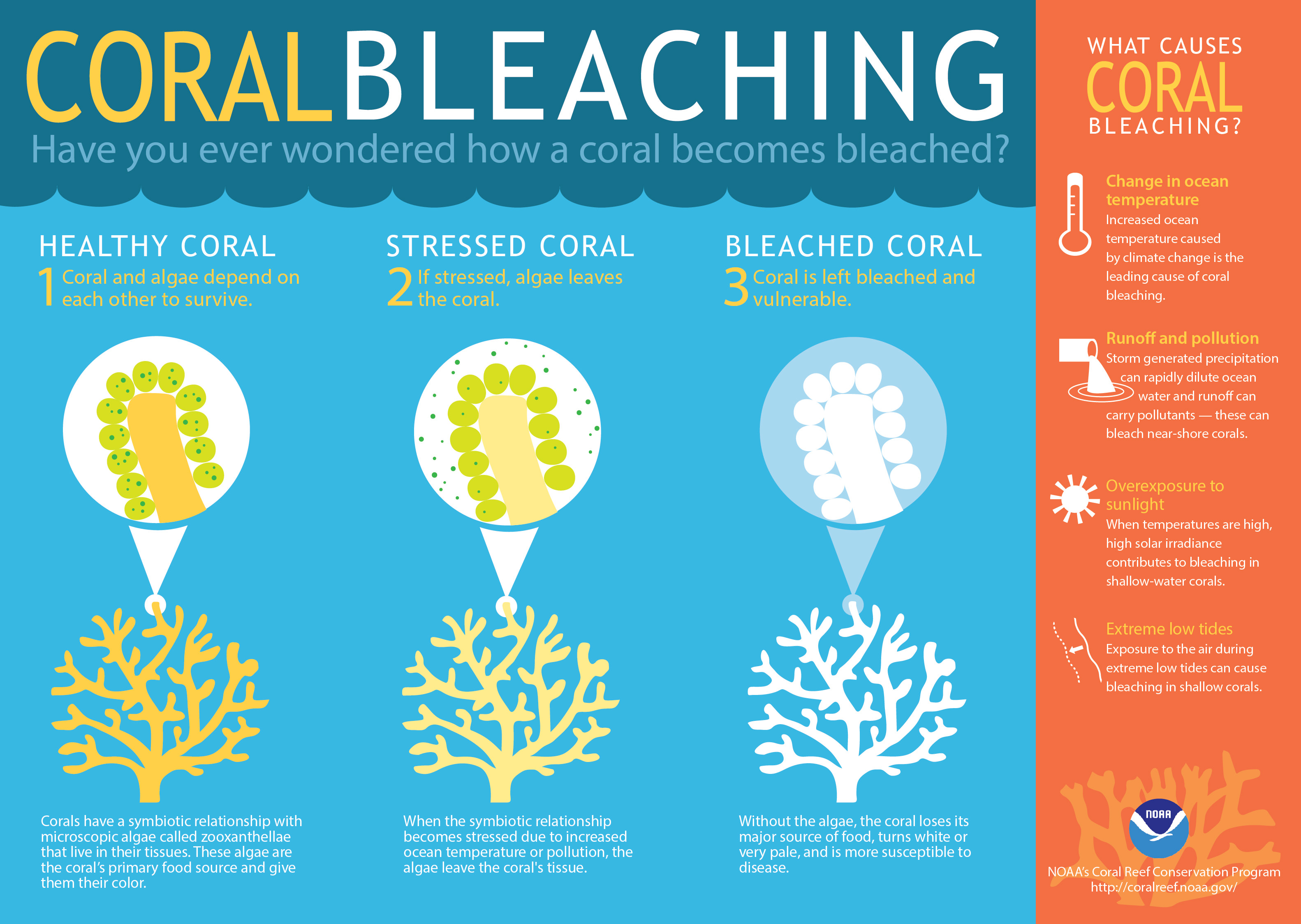Featured
- Get link
- X
- Other Apps
Coral Reef Pollution Statistics
We know its difficult to tell good from bad but we are working on making it easier. With a wide variey of plant animal and microbial life they are not only beautiful destination for divers but an important indicator of ocean health.
 Climate Change Impacts On The Great Barrier Reef
Climate Change Impacts On The Great Barrier Reef
Pollution from land-based sources is a primary cause of coral reef degradation throughout the world.

Coral reef pollution statistics. Boat anchors and shipping lanes can severely damage the physical structure of coral reefs. Overfishing leads to the depletion of key species which are needed to maintain these ecosystems. Third is pollution and.
Coral reefs deliver ecosystem services for tourism fisheries and shoreline protection. The abundance of corals on the worlds coral reefs typically measured as percent benthic cover has declined for many decades due to a broad range of anthropogenic stressors 12The rate and. Destructive practices such as fishing with explosives.
At this point an estimated 36 percent of coral reefs worldwide have been affected by major bleaching with nearly all reefs experiencing some thermal. The pollution content in the ocean is increasing. Sediment and pollution from inland sources threaten about one-third of Caribbean coral reefs.
The annual global economic value of coral reefs is estimated between US30375 billion67 Coral reefs are fragile partly because they are sensitive to water conditions. The effect depends on how big the pollution is on coral reefs. As atmospheric temperatures rise so do seawater temperatures.
Analysis of more than 3000 watersheds across the region identified 20 percent of coral reefs at high threat and about 15 percent at medium threat from damage caused by increased sediment and pollution from agricultural lands and other land modification. Without this algae coral. The reef system in the Keys has been hit hard by climate change and disease which is especially tough because corals there help support fisheries worth an estimated 100 million every year.
Coral reefs rival the tropical rainforests as the most diverse ecosystems on Earth. Impacts from land-based sources of pollutionincluding coastal development deforestation agricultural runoff and oil and chemical spillscan impede coral growth and reproduction disrupt overall ecological function and cause disease and mortality in sensitive species. Global Threats to Coral Reefs.
During these 24 months around 16 of the worlds coral reefs were destroyed with scientists warning that half of those may have been lost forever. However the impact of long-term reef degradation on fish populations is unknown. These threats are caused by warmer atmospheric temperatures and increasing levels of carbon dioxide in seawater.
According to the Florida Keys National Marine Sanctuary ocean-related activities associated with coral reefs add more than 85 billion each year and 70400 jobs to the local economy in southeast. Support coral-friendly businesses when you buy seafood. More than 90 percent of worlds coral reefs will die by 2050.
Across the Caribbean the amount of reef surface covered by live coral has fallen about 80 percent in the last three decades the Global Coral Reef Monitoring Network says. In the Caribbean for example approximately 80 percent of ocean pollution originates from activities on land. The most visible effect on coral reefs is the fading of colors on coral reefs and the decrease in the number of fish in the ocean.
Many ecologists have expressed concern over the worldwide decline in coral cover due to global warming and associated coral bleaching overfishing and coastal pollution 15Coral reefs support a high diversity of fishes that may ultimately depend on corals for their survival. Coral reefs are part of an impressive ecosystem of marine life. It is now well accepted that many serious coral reef ecosystem stressors originate from land-based sources most notably toxicants sediments.
The ocean is threatened now pollution from day to day is always increasing. Runoff often carries large quantities of sediment from land-clearing high. Increased ocean temperatures and changing ocean chemistry are the greatest global threats to coral reef ecosystems.
As human populations expand in coastal areas development alters the landscape increasing runoff from land. In 2016 a nine-month marine heatwave caused the largest bleaching in record history destroying over 30 of Australias Great Barrier Reef. Bleaching also occurred in much of the western Indian Ocean including 69 percent to 99 percent of corals bleached and 50 percent dead in the Seychelles.
In 2016 heat stress encompassed 51 percent of coral reefs globally and was extremely severethe first mass bleaching 85 percent bleached of the northern and far-northern Great Barrier Reef killed 29 percent of the reefs shallow water corals. Earth has already lost half of its underwater rainforests over last 30 years. Photograph copyright Corel Corporation Scientists at NASAs Goddard Space Flight Center and at several universities around the world however may have at.
Moreover humans are still dependent on fossil fuel use to drive. At least 8 million tonnes of plastic are dumped in the ocean every year and it now pollutes even the. This warming causes corals to lose the microscopic algae that produce food that corals need placing stress on the corals.
These reefs which host thousands of species of fish and other marine life are a major component of biodiversity in the tropics. In the Caribbean Sea more than 80 percent of the corals have disappeared in recent decades. Coral reefs in the region are contaminated with 11bn pieces of plastic the research indicates.
 How Does Overfishing Threaten Coral Reefs
How Does Overfishing Threaten Coral Reefs
Threats To Coral Reefs Extraordinary Coral Reefsby Tara Kohli
Coral Reefs Ocean Health Index
 How Does Climate Change Affect Coral Reefs
How Does Climate Change Affect Coral Reefs
 Climate Change Is Devastating The Great Barrier Reef Climate Reality
Climate Change Is Devastating The Great Barrier Reef Climate Reality
 This Is Why Coral Reefs Are So Vital For The Planet The European Sting Critical News Insights On European Politics Economy Foreign Affairs Business Technology Europeansting Com
This Is Why Coral Reefs Are So Vital For The Planet The European Sting Critical News Insights On European Politics Economy Foreign Affairs Business Technology Europeansting Com
Status Of The World S Coral Reefs
Status Of The World S Coral Reefs
Reefbase Global Database Threats Reefs At Risk Southeast Asia Indonesia
 Reefs Are At Risk Reef Resilience
Reefs Are At Risk Reef Resilience
Overfishing The Great Barrier Reef
 How Does Pollution Threaten Coral Reefs
How Does Pollution Threaten Coral Reefs
 Percentage Of Coral Reef Area In Marine Protected Areas 2011 By Country Statista
Percentage Of Coral Reef Area In Marine Protected Areas 2011 By Country Statista

Comments
Post a Comment